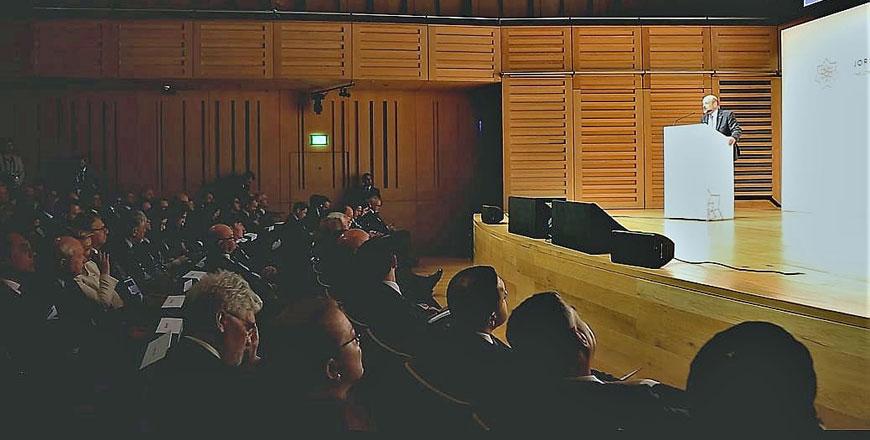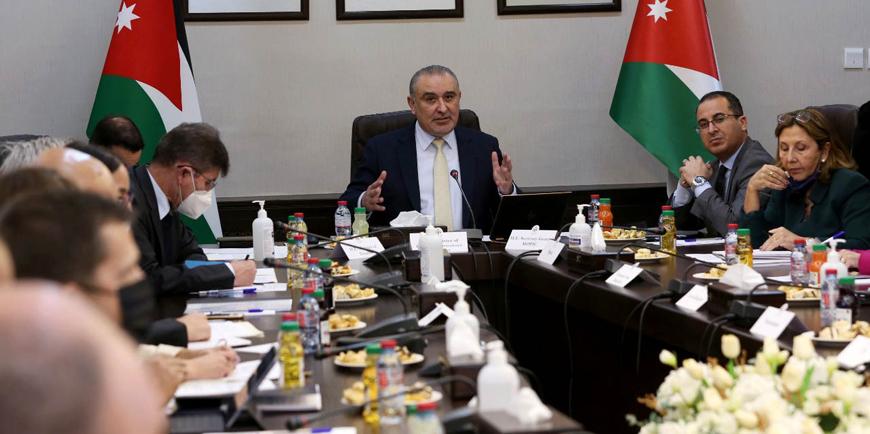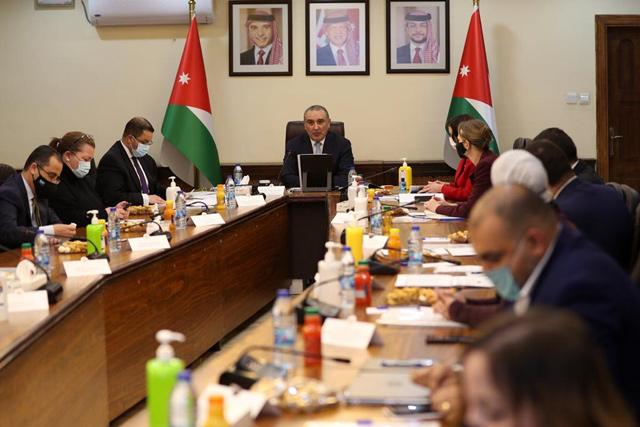You are here
Task force launched to follow up on implementation of London initiative outcomes
By Mohammad Ghazal - Mar 02,2019 - Last updated at Mar 02,2019

Prime Minister Omar Razzaz addresses the London initiative conference in London, the UK, on Thursday (Photo courtesy of Prime Ministry)
AMMAN — The London initiative has launched the “Jordan Task Force”, which represents a clear follow-up mechanism to ensure that commitments made in London are delivered.
The task force will be a joint effort between the UK, Jordan, donors and private sector, civil society and international financial institutions, which will be jointly chaired by the governments of Jordan and by the UK, according to a statement by the co-chairs of the London initiative 2019 (read full statement).
The conference, held on Thursday to support the Jordanian economy and investment, outlined the international community the Kingdom’s reform and growth plans and highlighted Jordan’s opportunities for investment.
Several countries pledged during the conference concessional loans, grants and technical assistance for Jordan.
The aim is to help stimulate economic growth, create jobs in the country and help it deliver on its commitments.
“The committee will convene every six months to review outcomes and provide advice and suggestions as needed, including, for example, in areas where activity had stalled or where progress could be expedited, to maximise the impact on Jordan’s growth,” the statement said.
As a sub-objective, the group would also act as a regular staging post for communicating progress in reform initiatives and their real-world impact to the wider international business community and the Jordanian population, according to the statement, a copy of which was obtained by The Jordan Times on Saturday.
On the private sector, the UK and Jordan will work closely together to follow up with business interests that were raised in London in order to turn them into investment in the medium-term.
The co-chairs of the initiative underlined that the international community needs to back this effort to make it a success, adding that the key to unlocking growth in Jordan is successful implementation of the government’s plans for reform.
“The challenge is significant, and economic transformation will be disruptive and will take time,” they declared in the statement.
“For this economic transformation to become a reality, Jordan will need the support of the international and regional stakeholders to better target and coordinate their support for economic reform, to enable Jordan to create a stable macro-economic environment for those reforms to mature,” the statement indicated.
Jordan’s development partners should therefore align their support towards backing Jordan’s vision for economic growth and plans for reform, which will also require the optimal financing modalities to fuel the reform plan in a sustained manner over the medium term, the co-chairs added.
Under the initiative, Jordan is committed to achieve economic transformation and economic growth is a priority area for support, they said.
“Growth is the only long-term term way of mitigating economic risks, and supporting the prosperity of all those who live in Jordan, including refugees,” according to the statement.
Bilateral, multilateral, NGO and private sector implementing agencies should look to significantly enhance their work on growth, creating stable conditions for reforms to mature and actively crowding in the private sector, the co-chairs indicated.
They also stressed that international partners should better align assistance behind Jordan’s priorities and they should look to transition to more long-term and sustainable assistance strategies, including through grants, concessional financing and loan guarantees.
Support to Jordan should go beyond financial aid to increased technical assistance through government-to-government and business-to-business technical exchanges, through more favourable policy, such as by extending and expanding trade concessions, and by fostering new partnerships with the private sector, the third sector, global financial centres and sovereign wealth funds, the co-chairs stressed.
Noting that the initiative marks the start of a new partnership approach between Jordan and the international community in pursuit of Jordan’s sustainable growth and self-reliance, the co-chairs highlighted Jordan’s vital role in promoting regional stability and moderation, as well as supporting the international effort to counter terrorism and extremism.
“Jordan is contributing a global public good by continuing to host and support significant numbers of refugees. Jordan’s long-term economic sustainability is critically important to the international community,” the co-chairs stated.
In their statement, they indicated that prudent policy has kept Jordan’s economy “remarkably resilient to significant external shocks”.
In this context, Jordan has been implementing macro-economic and fiscal adjustments equalling around 14 per cent of the GDP, in line with Jordan’s Extended Fund Facility arrangement with the International Monetary Fund, the statement established, adding that the Kingdom also has intensive reform efforts, mainly directed to improving the business and investment environment.
The co-chairs said Jordan has set out a credible vision and a detailed agenda to achieve economic transformation, adding that the time is now right for a renewed focus on growth and economic transformation.
In their statement, the co-chairs indicated that the international community commended Jordan’s recent reforms to eliminate all forms of gender discrimination from the Labour Law; making it mandatory for employers to provide childcare services to mothers and fathers alike, introducing a flexible work scheme to allow for greater participation of youth and women and endorsing codes of conduct to ensure the safety of the workplace and public transportation.
The international community also recognised the “substantial effort” by the Jordanian government, and agreed that implementation of the matrix presented at the event, a five-year reform and growth plan that combines short- and medium-term actions for a realistic economic transformation, is a priority area of support.
“The international community remains steadfast in its support to the government of Jordan for its hosting of refugees to ensure that refugees have quality education, cash assistance for vulnerable households and improved employment opportunities,” the statement said.
Related Articles
AMMAN — Minister of Planning and International Cooperation Nasser Shraideh and UK Minister for the Middle East and Asia Amanda Milling on Th
AMMAN — Minister of Planning and International Cooperation Nasser Shraideh on Thursday during the third Jordan Taskforce meeting since the 2
AMMAN — Minister of Planning and International Cooperation Imad Fakhoury has participated in several high-level meetings as part of Jordan’s


















